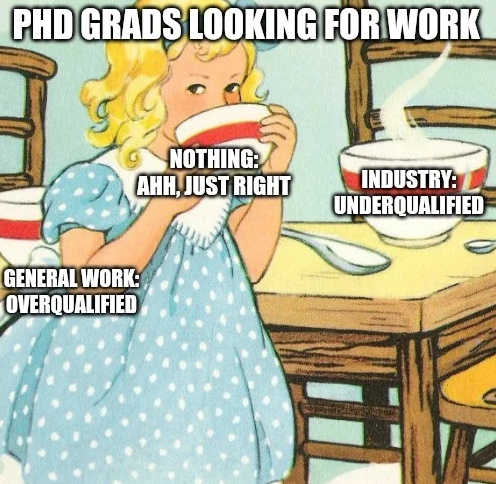this post was submitted on 03 Sep 2024
572 points (98.8% liked)
Science Memes
10885 readers
3746 users here now
Welcome to c/science_memes @ Mander.xyz!
A place for majestic STEMLORD peacocking, as well as memes about the realities of working in a lab.

Rules
- Don't throw mud. Behave like an intellectual and remember the human.
- Keep it rooted (on topic).
- No spam.
- Infographics welcome, get schooled.
This is a science community. We use the Dawkins definition of meme.
Research Committee
Other Mander Communities
Science and Research
Biology and Life Sciences
- [email protected]
- [email protected]
- [email protected]
- [email protected]
- [email protected]
- [email protected]
- [email protected]
- [email protected]
- [email protected]
- [email protected]
- [email protected]
- [email protected]
- [email protected]
- [email protected]
- [email protected]
- [email protected]
- [email protected]
- [email protected]
- [email protected]
- [email protected]
- [email protected]
- [email protected]
- [email protected]
- [email protected]
- !reptiles and [email protected]
Physical Sciences
- [email protected]
- [email protected]
- [email protected]
- [email protected]
- [email protected]
- [email protected]
- [email protected]
- [email protected]
- [email protected]
Humanities and Social Sciences
Practical and Applied Sciences
- !exercise-and [email protected]
- [email protected]
- !self [email protected]
- [email protected]
- [email protected]
- [email protected]
Memes
Miscellaneous
founded 2 years ago
MODERATORS
you are viewing a single comment's thread
view the rest of the comments
view the rest of the comments

It took me about 5 years to really transition into industry. It will, of course, vary greatly by industry specifics (mine ended up being tech, but my background is in Linguistics).
My best advice to anyone in this position is: stay in academic positions as long as you can (I lectured for nearly 10 years), but take on contract work concurrently until you find your foot in the door. A PhD is not really a "get a job out of academia" degree, and it really needs more work/networking to be respected in industry.
Edit: want to clarify this:
Remember that, typically, a Masters degree is where you go if you want to stand out in industry immediately, as it tends to be a more involved version of an undergraduate degree since it will have a more defined course structure and direction vs a PhD. Universities know this, which is why so many Masters programs are unfunded (many PhD programs are also unfunded, but friendly advice: never, ever do a PhD program that costs you money).
At the same time, it tends to be easy to get a Masters on the way to a PhD -- usually just some paperwork. In that sense, you may have a leg up just only reporting your Masters to certain companies. And of course, if you are in a PhD program, ask if you can sign off for the extra Masters on your way.
The PhD is unique in that it is specifically designed to require new research. Many companies do not see the value in paying more for that, though if you have a chance to show them the difference between you and another candidate, you'll win 99/100 times.
Edit 2: this is specifically PhD programs in the US, which are markedly different than other parts of the world.
Edit 3: and of course, the adage "publish or perish" does apply in academia. But academia, in my opinion, is not the meritocracy it used to be, at least in the US. Of my entire cohort of about 25 people, 2 became tenured professors -- and both of them have parents who are professors. Nepotism is rampant and probably means more than publishing in certain fields.
For industry, publishing means very little.
Not trying to be defeatist or change anyone's views here. Just giving my 2 cents since I have been in a relatively unique situation before.
This all sounds so weird coming from germany since here you do you bachelors degree, then your masters degree and then optionally your PhD. While the usefullness of the PhD and its duration vary between subjects (in IT it takes 3-5 years and is not really worth it money-wise if you go in the industry afterwards, while in medicine it can be done in a year or even less and is basically necessary). Also while you do your PhD you are usually employed by the government (since universities are public institutions) and paid well. A PhD earns you social prestige and prestige in the industry since - besides in medicine - nearly no one has one.
Yes. A very different story in the US. I was consistently jealous of some colleagues' experiences in Europe.
I should edit my original comment to specify specifically I am talking about the US.
I guess everyone understands that you are talking about US phds, so no worries :)
But yeah, doing your PhD in europe may not be simpler (we have to give lectures, organize seminars etc.) but considering that you get a good pay for your research as well, it is definitely a good alternative to going directly in the industry. However, doing your phd during your masters thesis or even starting without a masters degree is very uncommon, so you usually need more time to get it.